
December 16, 1971, is a date that will live in infamy in the history of Pakistan. On this date, Pakistani armed forces under the command of Lt Gen Amir Abdullah Khan Niazi surrendered before the Indian commander General Jagjit Singh Arora in Dhaka, before the world media. Pakistan was cut in half and what was once East Pakistan emerged on the map of the world as an independent sovereign new country.
Many in Pakistan believed that Bangladesh, with no mineral resources, problems of over-population, no oil or gas and lacking modern infrastructure will not be able to survive as an independent entity and will soon be gobbled up by India. Or, they thought, it would collapse under the weight of its own economic deficiencies or food shortages. Henry Kissinger had called it “an international basket case.” Before the partition of the country, East Pakistan had 56% of Pakistan’s total population, and only 15% of the total land area.
Now, 52 years after achieving independence from Pakistan, it has surpassed it in many social and economic indicators and that includes gross domestic product GDP, per capita life expectancy. Something to be noted is that in 1972 the size of the Bangladesh economy was $6.2 billion while that of Pakistan was $9.42 billion, and in the year 2022 the Bangladeshi economy grew to $460.2 billion and the Pakistani economy stood at $376.53 billion.
Economically, socially and politically Bangladesh has progressed by leaps and bounds by sheer hard work, serous economic planning and long-term policies. One major reason for this giant leap forward by Bangladesh is their adherence to politics based on secular parliamentary democracy. Today in Bangladesh the use of religion in politics is against the law of the land. The country has had its share of political turmoil: martial laws and bloodshed but it has risen like a phoenix from the ashes of ruin and destruction. There has not been a single case of suicide bombing or the slogan of jihad to establish the rule of Islamic Sharia in the country.
During the last 50 years of independence, the economic progress of Bangladesh has been remarkably and phenomenally impressive and commendable. The latest achievement of Bangladesh has been that it has become one of the leading countries of the world in achieving the United Nations Development Goals (SDGs). It is no longer a least developed country but a proud member of the developing nations of the world. From mass starvation in 1974, the country has achieved near self-sufficiency in food production for its 166 million-plus population. According to world economists, Pakistani politics has always been unstable, and that has impeded its economic progress. On the other hand, proper planning, political stability and a strong focus on growth have enabled Bangladesh to reach impressive levels of economic growth. According to former governor of the Bangladesh Bank Atiur Rahman, the country has performed better than Pakistan in economic and social indicators due to several factors.
“The first factor is liberal and inclusive political environment. The second one is persistent socio-political stability. Next is self-sufficiency in food,” he said. In 1972, Bangladesh’s GDP growth was negative 14% while that of Pakistan was 0.8%. In contrast, Bangladesh registered 7.1% GDP growth in 2022 while it was 6.2% in Pakistan. Between 2006 and 2022, Bangladesh consecutively enjoyed higher economic growth than Pakistan. Even during Covid-19 in 2020, Bangladesh maintained growth of 3.4% while that of Pakistan slipped to negative 1.3%. Another reason for Bangladesh’s progress is greater women’s empowerment, including nearly 40% female employment in formal sectors, particularly manufacturing.
Early investment by both public and non-government actors in low-cost solutions to address challenges in health, education, and other social sectors has helped Bangladesh outperform Pakistan. Both Bangladesh and Pakistan faced high inflationary pressure in recent times. However, Bangladesh’s inflation has not yet hit double digits, unlike Pakistan. In 2022, inflation was 7.7% in Bangladesh while it was as high as 19.9% in Pakistan. Bangladesh’s inflation rate had consistently been lower than that of Pakistan between 2019 and 2022. From 1972 to 2013, Pakistan’s exports had been higher than Bangladesh every year. But Bangladesh’s exports have jumped since 2014, reaching $59.28 billion in 2022. Pakistan’s 2022 exports were $39.42 billion.
Former lead economist at the World Bank's Dhaka office Zahid Hussain is of the view that infrastructure construction, including roads and bridges in rural areas, was the game-changer in Bangladesh’s overall economic development. The infrastructure boosted the village economy, which helped increase overall income, he noted. He said there had been political stability in Bangladesh since the 1990s. “During this period, reforms in various sectors, including agriculture and trade, were not reversed by the next governments after elections, which led to continuity in economic growth.”
The country has near-universal primary school enrollment and gender parity in education with 98% of children enrolled. The government is encouraging women to pursue a higher education and developing women entrepreneurs as a means of empowering them. The government's timely actions have increased female education in the country. As of 2023, the functional literacy rate (7+ years) in Bangladesh is now 62.92%, whereas the general literacy rate in the country is 74.23%. In addition, the functional literacy rate for people aged 11-45 in the country increased to 73.69% from 53.70% in 2011.
In retrospect, Bangladesh can be proud of many of its achievements of the past five decades. In areas where it has made progress; accolades must be shared amongst its stakeholders – the private sector, NGOs government and development partners.
However, much more is needed to be done in the area of promotion of democracy, good governance, and strengthening of Bangladesh’s core institutions that are entrusted to safeguard the constitutional rights and liberties of its citizens. In the long-term, strengthening of democracy, rule of law and good governance will yield rich dividends for Bangladesh in terms of sustained social and economic development – thereby attaining self-reliance.

